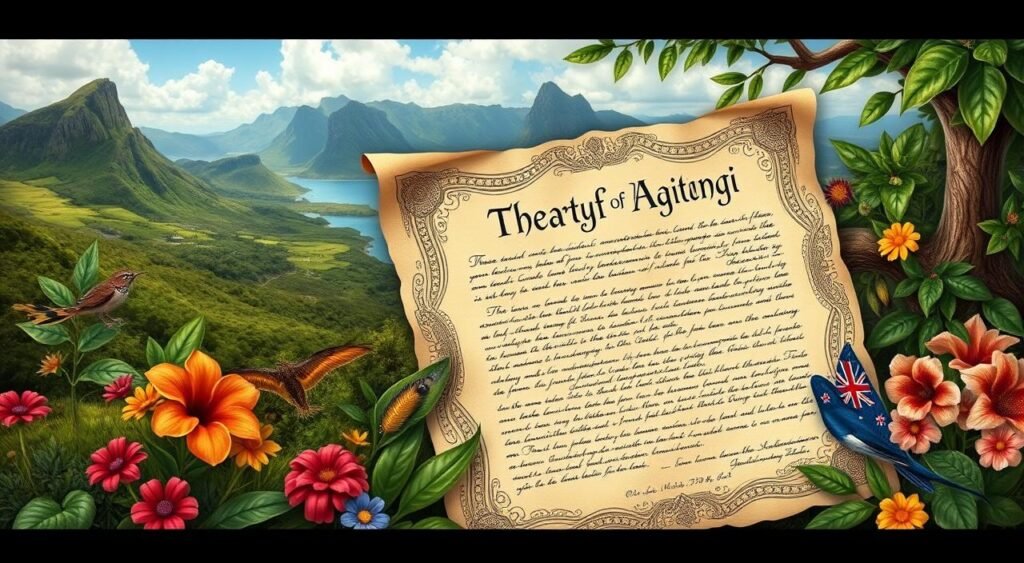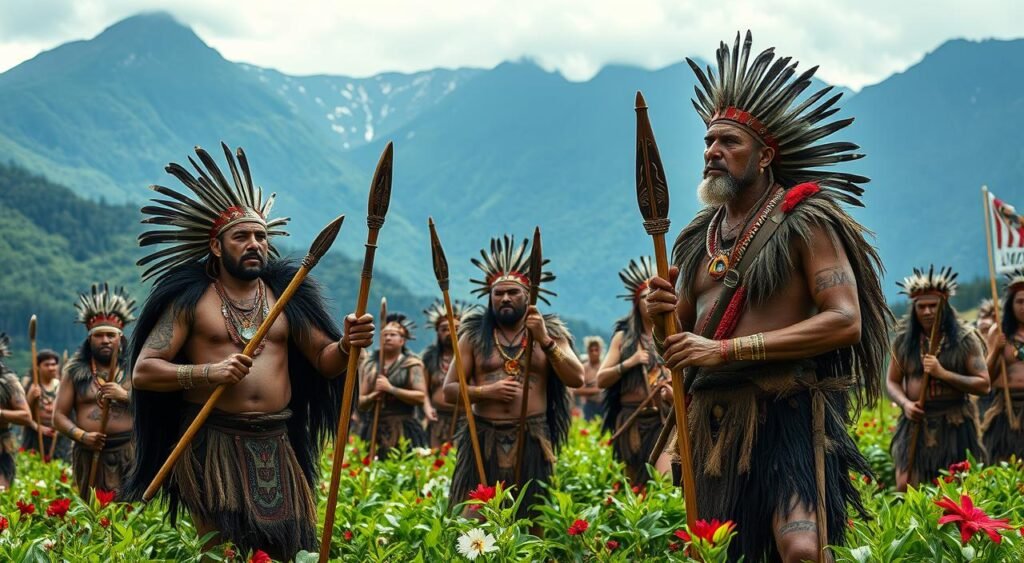The Treaty of Waitangi was signed in 1840. It’s a key part of New Zealand’s history and the fight for indigenous rights. But, a new government plan to change how this treaty is seen has caused big protests among the Maori.
The treaty bill wants to change how the Treaty of Waitangi is used. Maori activists are worried it could hurt their rights and freedom. Thousands of Maori are now in the streets, asking the government to keep the treaty’s original meaning and not make changes that could harm their communities.

This rise in Maori activism shows the long fight against colonial rule and for self-rule. It shows the tension between the Crown’s duties under the Treaty of Waitangi and the government’s plans to change it. The outcome of this fight will greatly affect indigenous rights in New Zealand and its colonial history.
Table of Contents
Background of the Treaty of Waitangi and Its Historical Significance
The Treaty of Waitangi is a key document in New Zealand’s history. It was signed in 1840 between the Maori people and the British Crown. This treaty has shaped Maori-Crown relations and the country’s laws and politics for many years.
Original Treaty Terms and Promises
The treaty has three main articles. Maori chiefs agreed to give sovereignty to the British Crown. The Crown promised to let Maori keep their lands, forests, and other properties. They also said Maori would get the same rights as British citizens.
Historical Implementation and Controversies
Implementing the Treaty of Waitangi has been filled with controversy. Despite its promises, Maori lost a lot of land and rights during colonial times. Debates over the treaty’s meaning and the Crown’s actions have caused ongoing tension.
Modern Interpretations and Legal Status
In recent years, the Treaty of Waitangi has become more important and legally recognized. It is now seen as a key document in New Zealand. Efforts are being made to fix past wrongs and protect Maori rights. The treaty’s rules are being used in laws and court decisions, showing its growing role in the country’s laws.

“The Treaty of Waitangi is a living document, one that must be constantly reinterpreted and reapplied to the changing circumstances of our nation.”
– Sir Hugh Kawharu, Maori scholar and treaty expert
Current Wave of Maori Protesting Over Colonial-Era Treaty Bill
The Maori people of New Zealand are leading a growing protest against the government’s plans to change the Treaty of Waitangi. This historic document has long been a point of contention. The protests are fueled by a strong concern for indigenous rights and sovereignty.
Maori opposition centers on the belief that the proposed bill aims to undermine the Treaty’s original promises. Activists say the bill would weaken Maori land rights, language, and cultural practices. They fear it would undo the progress made through years of activism.
The protests have taken many forms, from big rallies to occupying government buildings. Key figures include Maori leaders, iwi representatives, and grassroots organizers. They aim to protect the mana (prestige and authority) of the Maori people.
Maori activism has also gained support from other parts of New Zealand’s political scene. Opposition parties and civil society groups have shown their support. The protests have kept the treaty bill issue in the spotlight, pushing the government to rethink its plans and talk with the Maori community.

The debate over the treaty bill highlights the ongoing fight for indigenous rights and self-determination in New Zealand. The outcome will affect the Maori people’s future and New Zealand’s commitment to partnership and power-sharing.
Key Points of Contention in the Treaty Bill
The proposed Treaty bill analysis in New Zealand is causing a lot of debate. The government wants to change how the Maori sovereignty and indigenous rights legislation are seen. But, the Maori community and their supporters are strongly opposing these changes.
Proposed Changes to Treaty Interpretation
The New Zealand government policy plans to alter the Treaty of Waitangi’s meaning. They aim to redefine Maori rights and change the power balance between the government and indigenous groups.
Impact on Maori Rights and Sovereignty
Maori leaders believe the bill could harm their rights and Maori sovereignty. They worry it might reduce their power to make claims and take part in important decisions.
Government’s Stance and Justification
The government says the Treaty bill analysis is needed for clear and consistent treaty interpretation. They believe the changes will make the process smoother and fairer for everyone in New Zealand.
“The government’s proposed changes to the Treaty of Waitangi risk undermining the hard-fought rights and sovereignty of the Maori people. This is a critical moment for the future of indigenous rights in New Zealand.”
Scale and Organization of the Protests
The Maori protest organization has brought together thousands of indigenous people across New Zealand. They are showing their opposition to the Treaty of Waitangi bill. The size of these nationwide demonstrations shows how deeply the community cares about the treaty’s future.
Organizers have used many ways to get people involved and keep the civil disobedience going. They have set up protests in key places like government buildings and historical sites. They also use social media to share news and plan their actions.
More and more people, from elders to young activists, are joining the protests. This shows that the community is united against the changes to the treaty. They want to protect their rights and the treaty’s meaning.
| Location | Estimated Participants | Key Protest Activities |
|---|---|---|
| Wellington | 5,000+ | Marches, sit-ins, civil disobedience |
| Auckland | 3,500+ | Rallies, haka performances, blockades |
| Waitangi | 2,000+ | Occupations, speeches, cultural ceremonies |
| Rotorua | 1,500+ | Marches, traditional ceremonies, community gatherings |
The protests have caught the attention of people all over the world. They show the Maori community’s strong will to protect their rights and sovereignty. This is all based on the Treaty of Waitangi.
Economic and Social Implications of the Treaty Changes
The proposed changes to the Treaty of Waitangi in New Zealand have raised concerns. These concerns are about the economic and social impact, especially on the Maori community. The Maori people, as the custodians of the land and resources, will be significantly affected by these changes.
Potential Impact on Maori Communities
The Maori community fears that the treaty changes could undermine their rights and sovereignty. This could jeopardize their access to natural resources and their ability to make decisions about their ancestral lands. Such changes could disrupt Maori livelihoods, cultural traditions, and overall well-being.
Business and Property Rights Concerns
The business community in New Zealand has also expressed concerns. They worry about the potential impact on property rights and the business climate. Investors and businesses may be hesitant due to legal uncertainties and the possibility of increased regulatory burdens. This could stifle economic growth and foreign investment in the country.
International Investment Considerations
The proposed treaty changes could also affect international investment in New Zealand. Investors may be hesitant to commit resources if the legal and regulatory landscape becomes less predictable. This could lead to a decline in foreign direct investment and overall economic development.
The economic and social implications of the treaty changes are complex and far-reaching. They have the potential to significantly impact Maori communities, the business sector, and the broader international investment climate in New Zealand. Balancing the interests of all stakeholders will be crucial in navigating these changes. This will ensure a prosperous and inclusive future for the country.
International Response and Indigenous Rights Context
The New Zealand government’s plan to change the Treaty of Waitangi has caught the world’s eye. Many are watching closely, as they see it as a test of indigenous rights. The United Nations Declaration on the Rights of Indigenous Peoples is key here. It supports the self-determination of indigenous peoples and their right to keep their cultures and traditions alive.
Indigenous communities around the world face similar challenges. They fight for their sovereignty and to have their treaties respected. In Canada, there’s a push to make amends with First Nations. In Australia, there are ongoing disputes over land rights. These struggles are all about fighting against dispossession and cultural suppression.
The protests in New Zealand have caught the attention of human rights groups and indigenous rights advocates worldwide. They are urging the government to make sure any treaty changes respect Maori rights. The outcome of this situation could impact indigenous rights globally.
YOU MAY ALSO LIKE THIS Anti-landmine Groups Slam US Ukraine Mine Support
FAQ
What is the Treaty of Waitangi?
The Treaty of Waitangi is a key document in New Zealand’s history. It was signed in 1840 between the British Crown and Māori chiefs. It set the stage for British settlement and recognized Māori rights and interests.
What are the current protests about?
The protests are about a bill that could change how the Treaty of Waitangi is seen and used. Māori activists and communities are worried. They think the changes could harm their rights and sovereignty.
Why is the Treaty of Waitangi so important to Māori people?
For Māori, the Treaty of Waitangi is a sacred document. It marks the agreement between their ancestors and the British Crown. It’s at the heart of Māori activism and legal fights to protect their rights and uphold the treaty’s promises.
What are the main points of contention in the proposed treaty bill?
The main issues include changes to how the treaty is understood. These could affect Māori rights and sovereignty. Māori leaders say the changes go against the treaty’s original intent and spirit.
How widespread and organized are the Māori protests?
The protests are widespread across New Zealand. Māori activists have used marches, civil disobedience, and social media to mobilize. Their efforts aim to draw attention to their concerns.
What are the potential economic and social implications of the treaty changes?
The changes could impact Māori communities, business, and property rights. They could also affect New Zealand’s investment climate. Māori leaders fear these changes could worsen inequalities and limit their role in the country’s growth.
How does this issue fit into the global context of indigenous rights?
The New Zealand protests are part of a global push for indigenous rights. The proposed bill has faced criticism from around the world. Critics say it goes against the UN Declaration on the Rights of Indigenous Peoples.
